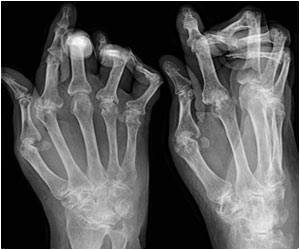Tocilizumab may be effective and may lead to a sustained clinically meaningful improvement in children suffering from polyarticular Juvenile Idiopathic Arthritis

"JIA is a chronic arthritis occurring in 1 in every 1,000 children. With no known cause, it can lead to joint damage and permanent disability. These data show that tocilizumab rapidly improves signs and symptoms of pcJIA, with meaningful clinical responses maintained in a large proportion of patients at week 40," said lead author Dr. Fabrizio De Benedetti of the IRCCS Ospedale Pediatrico Bambino Gesu, Rome.
Speaking on behalf of the Paediatric Rheumatology International Trials Organisation (PRINTO) and Pediatric Rheumatology Collaborative Study Group (PRCSG), who had overseen this study, Dr. De Benedetti concluded that "these data suggest that tocilizumab is going to be a novel biologic part of the therapeutic armamentarium for pcJIA."
CHERISH is a two-year, 3-part trial being conducted at 58 centres across 15 countries. Patients aged 2-17 years were included in the study if they had active pcJIA for at least 6 months and had failed to respond to methotrexate (a cornerstone of therapy worldwide for this condition).
Part 1 of the study was a 16-week open-label phase in which 188 patients received tocilizumab every four weeks. The 166 patients who achieved at least a 30% improvement in symptoms and signs of pcJIA (an JIA ACR30* response) went on to part 2, which was a 24-week study in which patients were randomised to continue on the same dose of tocilizumab or to receive placebo. Part 3 is an ongoing open-label study.
Advertisement
Dosing of tocilizumab was based on the patient's body weight (BW): with a BW ¡Ý30 kg, the dose was 8 mg/kg [n=119]; with a BW <30 kg, patients were randomly assigned to 8 mg/kg [n=34] or 10 mg/kg [n=35].
Advertisement
Patients were also taking background medications, such as methotrexate and oral corticosteroids (79% and 46% respectively).
Tocilizumab's safety profile was consistent with that found in other tocilizumab-treated patients.2 At the safety data cut, 184 patient years of follow-up had occurred in the 188 patients enrolled. Infection was the most common adverse event (164/100 patient years) and serious adverse event (4.9/100 patient years). Liver enzyme (ALT/AST) elevations ¡Ý3¡Á upper limit of normal occurred in 3.7 % / <1% of patients, neutropenia (<1000 cells/mm3) in 3.7% of patients, thrombocytopenia (<50,000 cells/mm3) in 1.1% of patients. An elevation of LDL-cholesterol ¡Ý110 mg/dl was reported in 11.4% of patients who received tocilizumab.
Source-Eurekalert










